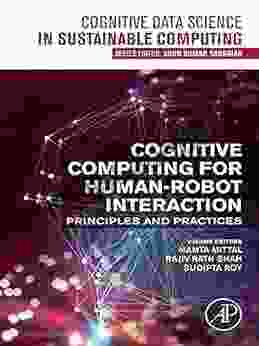Principles and Practices of Cognitive Data Science in Sustainable Computing

Cognitive data science is the merging of cognitive science and data science, and it has the potential to bring significant benefits to the field of sustainable computing. Cognitive science is the study of the human mind and how it works, while data science is the study of collecting, analyzing, and interpreting data. When these two fields are combined, they can create powerful new tools and techniques for understanding and solving problems in a variety of domains, including sustainable computing.
4.3 out of 5
| Language | : | English |
| File size | : | 17799 KB |
| Text-to-Speech | : | Enabled |
| Screen Reader | : | Supported |
| Enhanced typesetting | : | Enabled |
| Print length | : | 740 pages |
Principles of Cognitive Data Science
There are a few key principles that underlie cognitive data science, including:
- The human mind is a complex system that can be understood through scientific methods. Cognitive data scientists use a variety of techniques, such as fMRI scans and EEG recordings, to study the human mind and how it processes information.
- Data is essential for understanding the human mind. Cognitive data scientists use large datasets to build models of the human mind and to identify patterns and relationships that would not be possible to detect without data.
- Computers can be used to simulate the human mind. Cognitive data scientists use computer models to simulate the human mind and to test theories about how it works.
Practices of Cognitive Data Science
Cognitive data science is a new field, and there are still many challenges that need to be addressed. However, there are already a number of promising practices that can be used to apply cognitive data science to sustainable computing. These practices include:
- Using cognitive models to understand energy consumption. Cognitive data scientists can use cognitive models to understand how people use energy and to identify opportunities for energy savings.
- Using cognitive models to optimize resource allocation. Cognitive data scientists can use cognitive models to optimize resource allocation in data centers and other computing environments.
- Using cognitive models to develop new sustainable computing technologies. Cognitive data scientists can use cognitive models to develop new sustainable computing technologies, such as energy-efficient processors and renewable energy sources.
Benefits of Cognitive Data Science for Sustainable Computing
Cognitive data science has the potential to bring a number of benefits to the field of sustainable computing, including:
- Increased energy efficiency. Cognitive data science can help to improve energy efficiency in a variety of ways, such as by identifying opportunities for energy savings and by optimizing resource allocation.
- Reduced resource consumption. Cognitive data science can help to reduce resource consumption by optimizing resource allocation and by developing new sustainable computing technologies.
- Improved environmental protection. Cognitive data science can help to improve environmental protection by reducing energy consumption and resource consumption.
Cognitive data science is a new and promising field that has the potential to make a significant contribution to sustainable computing. By combining the principles and practices of cognitive science and data science, cognitive data scientists can develop new tools and techniques for understanding and solving problems in sustainable computing. These benefits include increased energy efficiency, reduced resource consumption, and improved environmental protection.
4.3 out of 5
| Language | : | English |
| File size | : | 17799 KB |
| Text-to-Speech | : | Enabled |
| Screen Reader | : | Supported |
| Enhanced typesetting | : | Enabled |
| Print length | : | 740 pages |
Do you want to contribute by writing guest posts on this blog?
Please contact us and send us a resume of previous articles that you have written.
 Novel
Novel Page
Page Text
Text Library
Library Paperback
Paperback Magazine
Magazine Newspaper
Newspaper Paragraph
Paragraph Sentence
Sentence Bookmark
Bookmark Shelf
Shelf Glossary
Glossary Synopsis
Synopsis Annotation
Annotation Footnote
Footnote Manuscript
Manuscript Bestseller
Bestseller Classics
Classics Library card
Library card Biography
Biography Dictionary
Dictionary Resolution
Resolution Librarian
Librarian Catalog
Catalog Card Catalog
Card Catalog Borrowing
Borrowing Stacks
Stacks Archives
Archives Periodicals
Periodicals Reserve
Reserve Academic
Academic Journals
Journals Reading Room
Reading Room Interlibrary
Interlibrary Literacy
Literacy Thesis
Thesis Storytelling
Storytelling Awards
Awards Reading List
Reading List Textbooks
Textbooks Starhawk
Starhawk Jan Nijman
Jan Nijman Fransje De Waard
Fransje De Waard Julian Street
Julian Street Lawrence Burns
Lawrence Burns Jessica Chen Weiss
Jessica Chen Weiss Dana Lindahl
Dana Lindahl Christopher A Preble
Christopher A Preble Debbi Coder
Debbi Coder Paul Hensler
Paul Hensler Clive Matthews
Clive Matthews Edith Wharton
Edith Wharton Gary Trent
Gary Trent Mimi Barbour
Mimi Barbour Annie Groves
Annie Groves Domingo Morel
Domingo Morel Atlas Rose
Atlas Rose Evelyn M Simien
Evelyn M Simien Chris Ferrie
Chris Ferrie Robert Weiss
Robert Weiss
Light bulbAdvertise smarter! Our strategic ad space ensures maximum exposure. Reserve your spot today!

 Jaylen MitchellMastering the Classics: Delving into the Classical Piano Method Repertoire...
Jaylen MitchellMastering the Classics: Delving into the Classical Piano Method Repertoire...
 Jedidiah HayesBeginner's Guide to Learning the Saxophone: Reading Music and Playing Songs
Jedidiah HayesBeginner's Guide to Learning the Saxophone: Reading Music and Playing Songs Jerry WardFollow ·7.2k
Jerry WardFollow ·7.2k Charles BukowskiFollow ·19.5k
Charles BukowskiFollow ·19.5k Nick TurnerFollow ·6.8k
Nick TurnerFollow ·6.8k Forrest BlairFollow ·8.3k
Forrest BlairFollow ·8.3k Tom HayesFollow ·15.8k
Tom HayesFollow ·15.8k David Foster WallaceFollow ·13.5k
David Foster WallaceFollow ·13.5k Noah BlairFollow ·5.2k
Noah BlairFollow ·5.2k Doug PriceFollow ·14.6k
Doug PriceFollow ·14.6k

 Diego Blair
Diego BlairUnveiling Hidden Crete: A Comprehensive Review of Richard...
In the tapestry of travel literature,...

 Earl Williams
Earl WilliamsNew Addition Subtraction Games Flashcards For Ages Year
Looking for a fun...

 Julio Ramón Ribeyro
Julio Ramón RibeyroUnveiling the Nexus of Educational Politics and Social...
Education, a fundamental pillar of society,...

 Jordan Blair
Jordan BlairTrains, Planes, Ships, and Cars: The Evolution of...
Transportation...

 Derek Bell
Derek BellFalling for Rachel Stanislaki: An Unforgettable Literary...
Step into the...

 Harry Cook
Harry CookAn Introduction to Cardiac Surgery for Anesthesia...
Cardiac surgery is a specialized...
4.3 out of 5
| Language | : | English |
| File size | : | 17799 KB |
| Text-to-Speech | : | Enabled |
| Screen Reader | : | Supported |
| Enhanced typesetting | : | Enabled |
| Print length | : | 740 pages |








